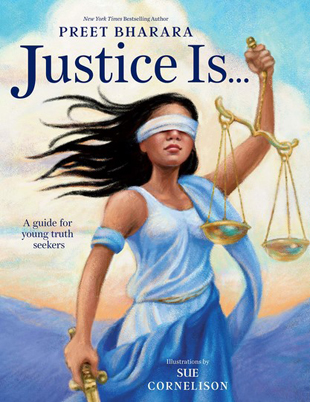Children can most readily understand justice when they see it embodied. In Justice Is ..., Preet Bharara helps young readers find their own ways to stand up for this essential principle by focusing on courageous souls who have devoted their lives to its practice.
Bharara has considerable experience from which to write about what justice means. Nominated in 2009 by President Barack Obama to be U.S. attorney for the Southern District of New York, he served for 18 years, supervising more than 200 attorneys who handled cases involving domestic and international terrorism, narcotics and arms trafficking, financial and healthcare fraud, cybercrime, public corruption, gang violence, organized crime, and civil rights violations. His writings about justice have reached the New York Times bestseller list.
He encourages young readers to ask all kinds of people to join their search for justice, which "needs to hear every side of the story." Pages offer glimpses into the contributions of Frederick Douglass, Sonia Sotomayor, Malala Yousafzai, Nelson Mandela, Harvey Milk, the Black Lives Matter movement, and many more. Further details about each of these justice mentors appear in a closing section.
Young readers will benefit from having adult guidance in understanding some of the material presented here. The book does not shy away from the cost of pursuing justice. For the pages devoted to Elizabeth Eckford, one of the first Black students to integrate an all-white high school in Little Rock, Arkansas, in 1957, illustrator Sue Cornelison shows other students jeering at Eckford: "Standing up for Justice can get lonely." The book acknowledges that justice can be slow, dangerous, and "can even be denied — for a time," as illustrated by Japanese American internees during World War II. Scenes from the Holocaust, tenement slums, slavery, and the Trail of Tears — sensitively rendered for four to eight year olds — reveal that sometimes it seems "there is no Justice in the world."
But the book crescendos to the importance of people keeping watch and working together — or alone when necessary — to make sure that justice prevails. We are left sharing the conviction of Sonia Sotomayor, Associate Justice of the U.S. Supreme Court:
"None of us can afford to
be bystanders in life.”
